26. Regatta Preparation |
by Sebastien Godefroid |
|
About sunscreen and some other stuff you have to do...
|
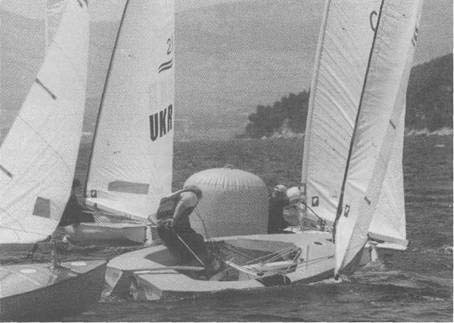 |
Finn sailors of today, wear sunscreen. If I could offer you only one tip for the future, sunscreen would be it. A long term benefit of sunscreen has been proved by scientists, whereas the rest of my advice has no basis more reliable than my own meandering experience. I will dispense this advice now.
Peaking
It is almost impossible to be at your best all the time. Therefore it is important to choose some important regattas during the year and peak at those highlights. Remember, sailing is a very complete and therefore complicated sport, so even though you prepared everything perfectly, things can still go wrong, so don't over focus on just one regatta. I think (and I'm quite sure many other good sailors do so), the most important thing is to keep on having fun, no matter how important the results get. |
|
Fitness
In the long term it's very important to feel fit. You can be lucky, and it can be light winds all the time, or there can be a day with no sailing just in time, but mostly this is not the case. You are better off being prepared for the difficult conditions. This will also make you mentally at ease. Before anything your endurance should be good. Cycling, rowing, blading, running... All kinds of long term exercises with a continuous strain are good to work on your endurance. You must do about 3 months of exercise, about 3 to 4 times a week to get this like it should be. This is if you were in reasonable condition before. Try to change the exercise now and then, and don't run all the time. The average Finn-sailor does not have the ideal running-body. So be gentle on your knees. You might miss them when they're gone... Anyway, when for one reason or another you do nothing (physical) for two days, and you kind of feel strange, a bit like a junky, then you know you're getting there. |
Power
The other very important part is the power. Most of us have enough power to sail pretty well for one or two days, but when you are going to sail more often, you need to be stronger, (especially if you wanna sail like Freddy), first to be able to keep on sailing, but even more important to stay free of injuries. When you are doing power training, try to get someone who knows a lot about it to help you with the program. Normally you start with a quite general program. The closer you get to your goal, the more specific you can work. But what is very important is to keep the balance in your muscles: if you do your quadriceps, also do your hamstrings, and this counts for all the muscles. This again is to be sure that your muscles grow in balance, and you keep on having a 'natural' posture. If you increase your power, you also have to increase your flexibility. So stretch!!!
|
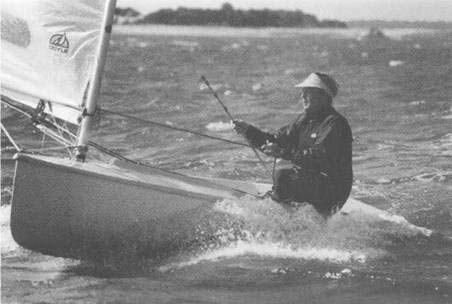 |
|
Diet
Another important feature of being an athlete is your food-intake. If you wanna perform like an athlete, you have to eat like one, and that's pretty hard sometimes. As most of us have a lot of problems keeping the weight up, an often and regular intake of carbohydrates is necessary. Next to that you need to eat enough proteins after the gym. It's really worth looking at a book and studying this part a bit, or again ask a specialist to help you with it. If you don't get this part right, you will be making a whole lot of effort without getting anywhere. I know how it feels, idiot I am.
|
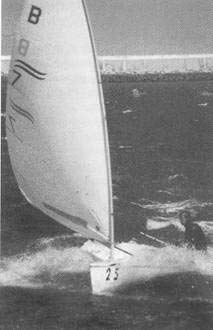 |
Training
Once you've got these four basic 'body-things', there's the sailing itself. I won't go into the mast-sail combination stuff, because that's a topic in itself and you'd better ask someone who knows more about it. What I will do is pick some topics and talk a little about them, just not to stay too general. That's also very important when you train: don't just go sailing. You need a plan every time you go training. If you just go sailing, without having anything particular in mind, you will spend a lot of time without improving very fast. Also try to find someone you like to train with and work together. There's nobody who can get to the top alone, we all need partners to train with.
Boat Handling
OK, I'll have a topic as an example. Let's start with manoeuvres. It is very good to start your training with a warm up. Let your body feel that it has to work a bit. For this you can start your training with some tacking and gybing. Also try to find somebody to film it. Sometimes you're surprised how many mistakes you see yourself make. Some ways to make it more interesting and more complete would be to do some match racing or put out a very small course and include mark roundings. That's also an important topic, getting up to speed after the mark rounding as fast as possible. When you observe some of the good guys at the upwind mark when they dropped back into the fleet, most of the time you see how they win 3-4 places in the first 30 meters after the mark, just because they are on the right track straight away. You are able to do this too, but you have to work on it. |
|
Speed
After that you could do some speed testing. I think there are different kinds of speed. First of all there's the basic speed. This is when you sail, without really concentrating on your speed, but just by feeling. You take time to look around or in training you sail blindfolded. This is very important. You have to be able to have a decent speed, while you're concentrating on something else. Most of the time this is what you're doing in a race too.
Another branch of speed is the acceleration at the start. It is very important to be able to lay still, close to other boats, and at a certain time take off as fast as you can and kill the boats around you. You can train to do this with two boats or more. Finally there's the speed that most of the time is tested before the regattas Just line up, try not to disturb each other, don't worry about the windshifts and just concentrate on your sail and the boat to go as fast as you can. This is done very often, but it almost never occurs during a regatta. |
A very important thing when you're testing is not to blame your equipment for your 'slowlyness'. Try again, see what the other is doing different, talk about it, swap boats... When you're training with a partner it's up to the fast one to help the slow one to be as fast as him. I know that sounds like giving your secrets away, but if you wanna get help when you're in trouble, you had better help the other when he's in trouble - that's teamwork. And if you happen to be number one and two in the world, then there's still enough time to start having (little) secrets for each other.
Training Tips
At the end of a training session I always like to have a race, to put into practice what you've been working on. Very often you will see that the one who was slow during the speed testing, beats the other in a race, just because he's looking around better, or his manoeuvres are better...
|
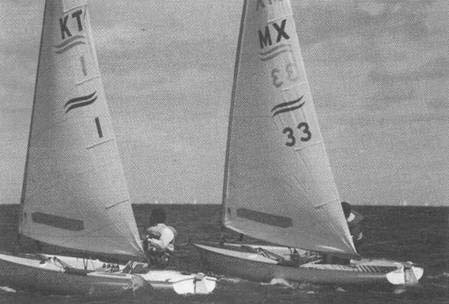 |
|
After a day of training discuss what happened that day, what the problems are and what you have learned, perhaps while stretching or doing a little ran. Also make notes, so you can fall back on them later when you're a little stressed because your regatta goes totally wrong and you don't know what to do anymore. Also make plans again for the next day, while you still know what went right and wrong.
Another tip for training. I'm convinced that training for example in blocks of 7 days helps much more than training 1 day at the time. You're more likely to remember what you did the day before in the same conditions when you trained 7 days in a row than when you trained 1 day and the last time you did this was a week ago. I think the best thing is to plan a weeks training with somebody on a certain theme, and work it out completely. It's of no use to do half work.
All this training should be done way before the regatta you are aiming for. When you go to a regatta you have to be sure that all you could do was done, so you don't have to blame yourself. You did it in the training, so you will be able to do it again during the regatta.
At the Regatta
Just before the major regatta you have to try to get some factors to an optimum. First of all I think it's important to feel at home. Try to be there in time (that's about a week before) and find yourself a nice place to sleep, find yourself the shops you will need, see where you can relax and have some 'quality time'... I think this all helps a lot to be confident and get in your normal training rhythm. You don't want surprises once the regatta starts - most of the time you get enough surprises on the water. |
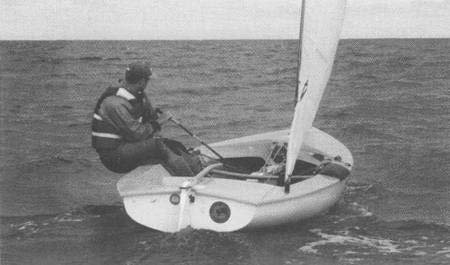 |
The next thing to prepare is to learn the conditions that prevail there. Get to know the local wind patterns, get to know the current, follow the pressure systems in the paper, talk to locals. Fisherman - most of the time - are a very big help. Try every day to predict what is gonna happen, write down what happened and at what time. Quite often there's a pattern that comes back every day, especially in warm places. All this sounds a lot, but once it gets a habit, it's not hard at all.
Try to get enough rest. It's not those few hours more on the water just before the race that are going to make the difference. You prepared yourself well, now it's time to relax and get fully motivated and with a hunger for sailing. I always like to sail a maximum of two hours the last two days before the race. |
|
Be Positive
Some people like to go to a race with some goals in mind. I rather prefer to go there, just do my best and see what happens. If you want to have some goals anyway, try to make them positive. This means, don't say: I don't want to capsize, but say: I want to stay upright. It is a bit the same as when you say to a room full of prisoners: Don't think about naked women, and you can imagine what they will be thinking about, just by using the words naked women, although there's a 'don't' in front. Also try not to relate your goals to the result. I realise sometimes this is different, but try it anyway. The reason why is that you can't control how the others are going to sail. You might have sailed very well, but the others might have been lucky, and you can't always help it. You can control how you sail yourself. If you have aims like 'I want to prepare my first beat very well and get the first beat right' or 'I want to make good mark roundings' or 'I want to sail my boat flat', then you are more or less fully under control. That's one of the reasons why somebody who wins a regatta sometimes still isn't happy, just because he knows he made some mistakes and he can do better, no matter if the others even did worse than him. |
Have Fun!
Once the regatta starts, make sure you check the notice board, you know what the weather forecast is, when it is high or low tide... Be on the water in time and try to find a pattern in the wind. Try to understand what is happening and predict what is going to happen. Keep on fighting all the time, it's not because you've lost a battle that you lost the war. Never give up. (Well, I suppose if your mast is broken, your sail is torn in three pieces and there's a big hole in your bow you might start to consider it.) Look at what the others do and try to imagine why they do it. Keep being flexible: the pattern might change, or you might have misunderstood it. You have to reconsider what to do all the time. And maybe the most important: have fun with your friends out there, if you really enjoy it, you're more likely to sail well too, and even if you don't, at least you had fun and it was much better than a day at the office.
|
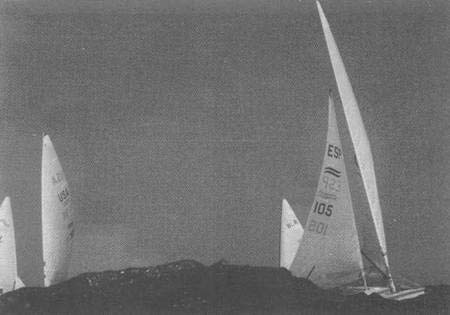 |
|
This is about all I can say to help you with preparing your next regatta. I hope you learned something from it, even if it is only to wear sunscreen. I've got a last tip for your regatta though. Don't waste your time on jealousy. Sometimes you're ahead, sometimes you're behind. The race is long, and in the end it's only with yourself. |
|